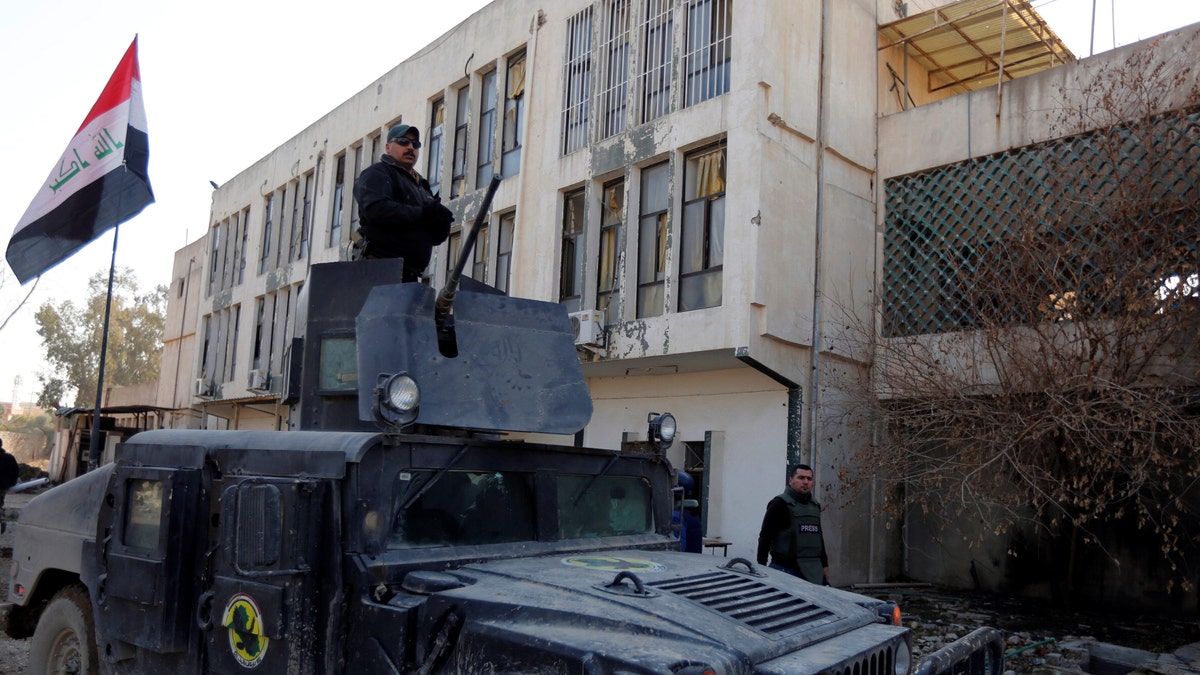
A member of Iraqi Special Operations Forces (ISOF) stands in a military vehicle at the University of Mosul during a battle with Islamic State militants, in Mosul, Iraq, January 14, 2017. REUTERS/Ahmed Saad - RTSVHSV
Iraqi special forces raised the Iraqi flag above the buildings at the Mosul University complex on Friday as they continued the battle for control of the city against Islamic State militants.
Senior Iraqi officers and U.S.-led coalition said the troops entered the university grounds in the morning hours and by afternoon they had taken control of a neighborhood on the northeastern edge of the university compound and the technical institute within the campus, according to special forces Brig. Gen. Haider Fadhil and Maj. Gen. Sami al-Aridi.
By evening, Iraqi forces had also taken control of the Nineveh governorate and council buildings, according to a statement from the U.S.-led coalition.
IRAQI FORCES ENTER MOSUL UNIVERSITY, TACTICAL ACHIEVEMENT IN ISIS BATTLE
"We congratulate the Iraqi Security Forces on their continued progress in Eastern Mosul,” U.S. army Col. John Dorrian, a spokesman for the U.S.-led anti-IS coalition said in a statement. “Work still needs to be done but ISIL's days in Mosul are quickly coming to an end.
Thick clouds of black smoke rose over the sprawling complex Saturday morning. By afternoon, clashes had intensified with volleys of sniper and mortar fire targeting the advancing Iraqi forces. Convoys of Iraqi Humvees snaked through the complex, pausing for artillery and airstrikes to clear snipers perched within classrooms, dormitories and behind the trees that line the campus streets.
The university is located in the eastern section of Mosul, Iraq's second-largest city which is divided by the Tigris River into roughly an eastern and a western half.
The push into Mosul University came a day after Iraqi army forces north of the city linked up with troops pushing in from the city's eastern edge. Iraqi forces have largely surrounded Mosul, but the most significant advances on the city have come from the eastern front and in the eastern half of the city. IS still controls Mosul's west.
The U.S.-led coalition supporting the Iraqi forces offensive on Mosul told The Associated Press on Friday that the Islamic State group "warped the purpose of a beloved institution of higher learning when they used the university for military purposes."
"The entire university has been burned," said Muhammad Dhia, a 26-year-old former university student who was fleeing Mosul on Thursday to try and complete his studies in Baghdad.
"I think it will take at least two or three years to rebuild," he added
Meanwhile in Syria, IS militants launched a new offensive on government-held areas in the city of Deir El-Zour on Saturday, attacking the eastern city from several sides in the most intense action in a year, the Syrian government and opposition activists said.
Syrian television said three people were killed and nine were wounded in IS rocket attacks on several neighborhoods of the city.
Intense fighting broke out between Syrian troops and IS members in the city and in the vicinity of a nearby military airport controlled by government forces after the militants launched their multi-pronged attack starting from the area of Baghaliyeh near the northwestern tip of the city.
Loud explosions that shook the city were reported. Activists said Syrian warplanes were taking part in the battles.
The Deir Ezzor 24 news network reported ongoing clashes since the morning near Deir el-Zour military airport and other fronts in the city and said Syrian warplanes targeted Baghaliyeh and Ayash areas and the vicinity of an army base known as Brigade 137 west of the city.
The extremist group, which controls most of Deir el-Zour province, has kept the provincial capital under siege since 2014. Government forces have withstood the encirclement thanks to air-dropped humanitarian assistance and weapons and ammunition flown into the airport. Remaining residents have reported malnourishment and starvation amid severe shortages of food, water and fuel.
The Islamic State group, which in 2014 seized large parts of Iraq and Syria and established a so-called Islamic caliphate straddling both sides of the border, is under intense pressure in both countries where it has lost significant territory in recent months.
The Associated Press contributed to this report.
